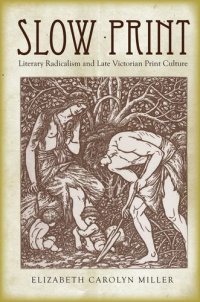
Ebook: Slow print : literary radicalism and late Victorian print culture
Author: Miller Elizabeth Carolyn
- Tags: Radicalism and the press -- Great Britain -- History -- 19th century. Journalism -- Political aspects -- Great Britain -- History -- 19th century. Press and politics -- Great Britain -- History -- 19th century. Printing -- Great Britain -- History -- 19th century. Mass media -- Great Britain -- History -- 19th century. English literature -- 19th century -- Political aspects.
- Year: 2013
- Publisher: Stanford University Press
- City: Stanford, California
- Language: English
- pdf
This book explores the literary culture of Britain's radical press from 1880 to 1910, a time that saw a flourishing of radical political activity as well as the emergence of a mass print industry. While Enlightenment radicals and their heirs had seen free print as an agent of revolutionary transformation, socialist, anarchist and other radicals of this later period suspected that a mass public could not exist outside the capitalist system. In response, they purposely reduced the scale of print by appealing to a small, counter-cultural audience. "Slow print," like "slow food" today, actively resisted industrial production and the commercialization of new domains of life.
Drawing on under-studied periodicals and archives, this book uncovers a largely forgotten literary-political context. It looks at the extensive debate within the radical press over how to situate radical values within an evolving media ecology, debates that engaged some of the most famous writers of the era (William Morris and George Bernard Shaw), a host of lesser-known figures (theosophical socialist and birth control reformer Annie Besant, gay rights pioneer Edward Carpenter, and proto-modernist editor Alfred Orage), and countless anonymous others.
Drawing on under-studied periodicals and archives, this book uncovers a largely forgotten literary-political context. It looks at the extensive debate within the radical press over how to situate radical values within an evolving media ecology, debates that engaged some of the most famous writers of the era (William Morris and George Bernard Shaw), a host of lesser-known figures (theosophical socialist and birth control reformer Annie Besant, gay rights pioneer Edward Carpenter, and proto-modernist editor Alfred Orage), and countless anonymous others.
Download the book Slow print : literary radicalism and late Victorian print culture for free or read online
Continue reading on any device:

Last viewed books
Related books
{related-news}
Comments (0)